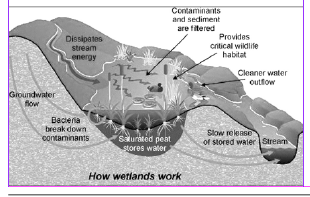Wetlands
A wetland is a land area that is saturated with water, either permanently or seasonally, such that it takes on the characteristics of a distinct ecosystem. Specifically, wetlands are characterized as having a water table that stands at or near the land surface for a long enough period each year to support aquatic plants. The primary factor that distinguishes wetlands from other land forms or water bodies is the characteristic vegetation of aquatic plants, adapted to the unique hydric soil.

Key Facts:
- Wetlands occur naturally on every continent except Antarctica, the largest includes ....
Do You Want to Read More?
Subscribe Now
To get access to detailed content
Already a Member? Login here
Take Annual Subscription and get the following Advantage
The annual members of the Civil Services Chronicle can read the monthly content of the magazine as well as the Chronicle magazine archives.
Readers can study all the material since 2018 of the Civil Services Chronicle monthly issue in the form of Chronicle magazine archives.
Bio–Diversity And Environment
- 1 India’s Current Achievements in Renewable Energy
- 2 Heat Waves: Causes, Effects and Impacts
- 3 Developing Climate Resilience in Indian Cities
- 4 Plastic Pollution in Indian Himalayan Region
- 5 Dam Management and Water Security in India
- 6 Issues with EVs and Possible Hybrid Solution
- 7 Phasing Out Coal: India’s Challenges
- 8 Curbing India's Black Carbon Emissions: Key Imperatives
- 9 Role of Agroforestry and ZBNF in ensuring Sustainable Agriculture
- 10 Plastic Pollution: Impact on Environment & Efforts

